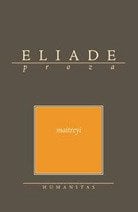
- Maitreyi
- Published by: Humanitas
- Level: Intermediate
- First Published in: 1933
It is an immensely popular, erotic, exotic, and realist-modernist novel that tells the impossible love between a Westerner and an Easterner in first-person narrative. It is a poignant tableau of the catastrophic clash between two different cultures and modes of life.

Mircea Eliade was a Romanian novelist, professor, religious historian, journalist, and philosopher. His literary work encompasses fantastic novels, novellas, and short stories, and the fulcrum of his literary creation is constituted by his skilful combination of fiction and reality, science and art, religion and myth, and the sacred and the profane.
"Maitreyi has been translated into over five languages , and continues to captivate literary aficionados all over the world."
Since its publication in 1933, his book Maitreyi has been translated into over five languages , and continues to captivate literary aficionados all over the world. It is an immensely popular, erotic, exotic, and realist-modernist novel that tells the impossible love between a Westerner and an Easterner in first-person narrative. It is a poignant tableau of the catastrophic clash between two different cultures and modes of life.
Allan is a determined British engineer in Calcutta, residing in the house of Narendra Sen, a hospitable Indian colleague. As a Westerner, Allan is fascinated with India and the exotic “Other ” and he endeavours to adopt the Bengali way of life. His subsequent encounter with Narendra Sen’s daughter, Maitreyi, proves to be a turning point in his life. During their first encounters, she fails to impress Allan. To him, she is not simply an ordinary Bengali girl, but even a rather ugly one, "cu ochii ei prea mari și prea negri, cu buzele cărnoase, cu sânii puternici de fecioară bengaleză, crescută prea plin” (with eyes that were too large and too black, thick and fleshy lips, and the powerful chest of a Bengali maiden who had developed too quickly). However, as time passes, he slowly becomes infatuated with her and is puzzled by the mysterious aura that surrounds her: “nu izbuteam să înțeleg ce taine ascunde făptura aceasta” (I could not fathom the mystery that lay hidden within this creature).

Allan goes on to discover that Maitreyi is a talented poet with a metaphysical outlook on life. She has “ un suflet pantheistic ” (a pantheistic soul) and “nu face deosebire dintre sentimentele ei si ale obiectelor” (makes no distinction between her own feelings and those of inanimate objects). However, due to their cultural differences, the two have competing views on love. While, in Maitreyi’s opinion, love belongs to the realm of the spiritual, for Allan, love is more physical and carnal. As their relationship blossoms, they overstep this fine boundary, and under the increasingly suspicious looks of Maitreyi’s family, the two secretly get engaged and consummate their love.
"It is a poignant tableau of the catastrophic clash between two different cultures and modes of life."
In the end, however, the two acknowledge that their marriage would never be approved by Maitreyi’s family, since according to them the only valid engagements are those “corectate de traditie, adica de familie” (tempered by tradition, in other words, by the family). When Narendra Sen finds out about his daughter’s transgression, he throws Allan out, warning him to cut off all contact with Maitreyi. Allan sinks into a depression, and wanders aimlessly into the Bengali countryside, mourning over the fact the two lovers will never see each other again . After a while, he decides to leave India for the Himalayas, where he begins writing a book in an attempt to make sense of all that has happened to him (which becomes the text of the novel). The prose is modern and includes no regionalisms or archaisms, as Eliade only uses literary, standard Romanian. However, the book is replete with English, French, and Bengali borrowings, such as “papuci tennis” (tennis shoes), “swarjism” (self-rule), “lalbanor” (white monkey), “Sisters of the Poor,” “volte-face,” and “prima-nox” (first night).

